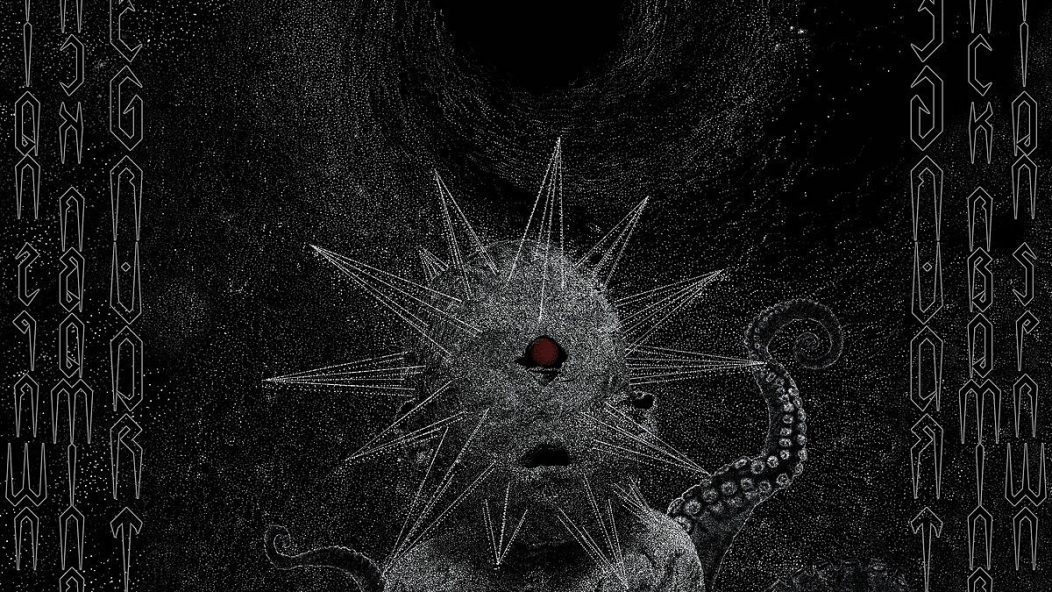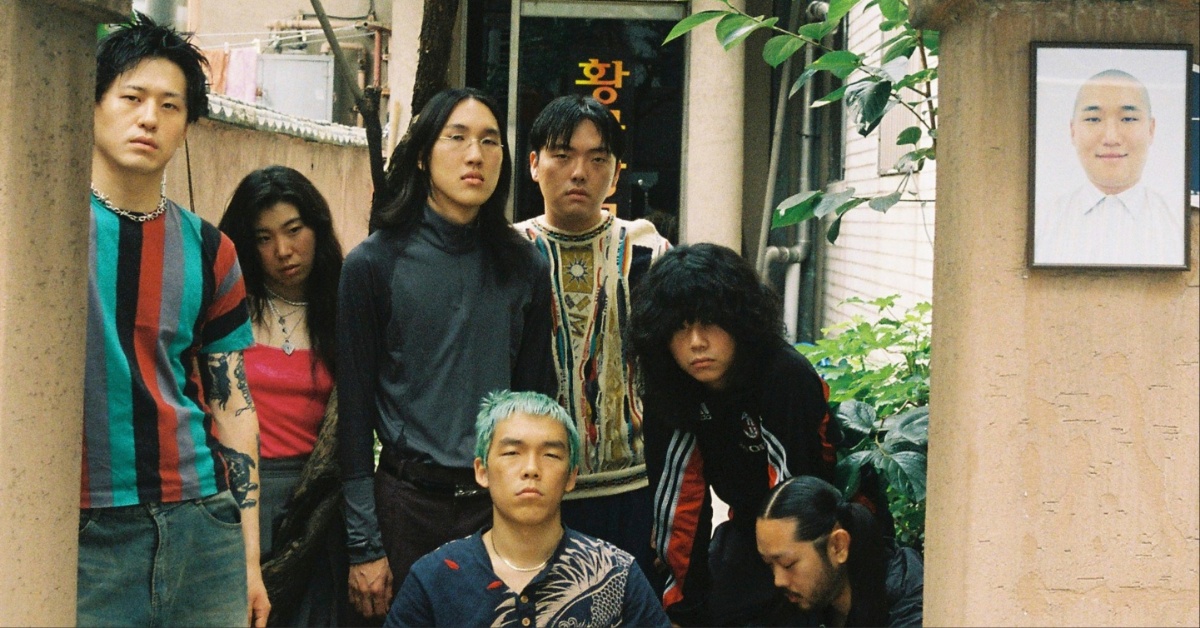
Entering the Underground #6: Omegavortex's Swirling Madness Coalesces on "Black Abomination Spawn"
Most modern death metal isn’t scary, dangerous, or controversial—except perhaps in how much people think it sucks. Death metal is a genre that has largely found a comforting groove to settle into, and most bands are happiest when they find an approach that lets them dream of courting big labels, playing big festivals, and getting attention from whoever the latest hyped darling band is.
Omegavortex eschew all that. Dense, obscure, and chaotic, their greatest desire seems to be nailing listeners to a wall with their fury. Despite existing in one form or another for well over ten years, it took until last year for the German band to drop a debut album; it’s clear that the time in between their first rehearsal demos and Black Abomination Spawn was well spent, and the album was a big favorite in underground circles come end of year time. Despite a sound that seems too abrasive (as funny as that sounds for death metal) to ever gain much traction outside the underground itself, Omegavortex’s sheer force has them poised to be a mainstay in death metal, and they’re well worth anyone’s time in checking out.
Read below for an interview with the band’s founder and visionary, R.
…
…
Hi Rob! Thanks for doing this interview with Invisible Oranges. To start, it’s been a few months since the new album, Black Abomination Spawn, dropped. How do you feel the reception was?
Hi Brandon, the reception is absolutely brilliant, even much bigger than expected. We’re getting killer feedback from maniacs and die-hards from all over the world like “this is too much I turn it off after two songs, too much to bear” to even saying it “puts all other releases to shame”, whatever you want it to be. Many are into the sound, which is rather wild and absolutely raw, exactly as intended. I am very satisfied. Looks like the thing got its message around, thoroughly great to see.
A standout is definitely the fact that people listen to OMEGAVORTEX for the sake of the music, not for the sake of all the other stuff that appeals to fans nowadays. The record itself generated the interest in it, not external sources, not vitamine B, nor any sort of name-dropping or annoying advertising.
The first vinyl press of the album sold out almost in a few months, despite all the worldwide difficulties with lockdowns, shipping slowed down and even having the release somewhat drained by the press since there was so much released in the last quarter of 2020 that it flew under radar for many, even considering its success, if you will.
Many known sites, mags and people ranked it as one of the best of 2020, which isn’t too bad either in terms of promotion: in many cases even preferred over releases which had ten times the visibility of what we have currently. It’s generally good to see people are still valuing this style of Death Metal in all the flood of boring riffless caverncore, “OSDM” and occult image-driven shit, hyped supergroups which we are opposed to. WE have met our goals with a large middle finger.
A Vinyl repress will hit in May, since there is still an increasing number of interest in Black Abomination Spawn, most are discovering it just right now. I assume it will still take a while until it’s over.
Does having met your goals mean that future material will be different, or does it provide more inspiration to continue refining your approach?
Once a goal is achieved, you look for bigger challenges. We will see what happens in future and yes, whatever that will be, will of course be different – but my definition of that is “at least twice as intense”: If someone believes we will now play slower, catchier, have more doomy sections, incorporate 1970s rock, goth rock, hundreds of guitar effects or any other nonsense then I am very glad to disappoint on all levels far in advance. That will never, ever happen. The opposite will be the case.
I estimate part of our next goal that will be staying with the raw sound/recording quality and perhaps making it even much rawer the next time. I have the impression that people – similar to my own taste – somewhat are more and more fed up with modern productions – even those that mimick oldschool with all the analogue simulations – and such that follow typical rules everyone is used to. Many albums simply sound the same, have the same volumes, same 1970-1980s reverb effects throughout all instruments, lack of aggression, sound dull, too much warmth or whatever. The listener is always driven to a rather ambitionless way of listening to music – I prefer to crank so-called rough or shitty recordings to max, so they get full live effect and enjoy them more than actual “studio productions”. That’s how extreme metal works.
Many people say that what we recorded and how it sounds like is exactly what maniacs need right now, who knows? If there will be new material, the raw edge will be exceeded.
The album came out on Invictus Productions. How did you get in touch with Darragh?
First off I always loved a lot of the stuff that Invictus has been releasing, especially Australian metal as well for its longevity and tradition. While re-branding the band with a new name, new plans for everything were made: I decided to quit working with Sepulchral Voice, in favour to look for something that fits even better: so I just got ahold of him via a close friend Vasili Vasilopoulos, who also released our 2018 promo tape. No big deal at all, he was interested as we were so we just started talking. I’m glad to be working with Invictus. Well, there were many other labels interested, in particular German ones but we turned down all these offers.
How was the experience of working with Sepulchral Voice, and how did you initially get in touch there? Was there any particular reason beyond the fit mismatch for moving on to Invictus?
I already knew the people before the label actually existed. From a fan perspective, I personally find too many of their releases of the last decade boring and sort of tame, uninspired and the excitement has worn off completely already a while ago. There are no real standouts to me anymore, some of the stuff is even mediocre at best. Things have begun to repeat themselves and that is not my thing. Besides the music, there were other developments that I wasn’t into.
The reasons to move on without them simply were in total more prominent and much more logical to me – it wasn’t really a big deal. Contrary to what one might assume I always thought the thing would have felt somewhat forced if it was put out there, even the 10″ feels like it is misplaced there in retrospect. To me, this is all very positive as a whole and like I said I see the development with Omegavortex and working with Invictus as a big step up. Everything is perfect the way it is now.
Prior to Omegavortex, you played in Ambevilence, to which Omegavortex is the spiritual successor. Why did you decide to change over the name and start anew under the current name?
No, it is absolutely not. It is the same band. It was renamed simply because the name didn’t fit – like bringing fresh air into a room that hasn’t been opened for a long time. It was given this name because it describes the music both in instrumental and lyrical terms perfectly. Dank and straight into your face.
All ideas and song material on Black Abomination Spawn album is material from before the name change, most of the stuff you hear on the record is actually rather very old by now. I wanted to get rid off both the niche-image that Ambevilence would represent as well as the logo, the label and all the surrounding. The potential was buried by that and required drastic change to become fully realised. It simply HAD to be done this way otherwise you’d be interviewing another band instead of us right now.
These ideas were floating in my mind for quite a while, since the thing was on a hiatus for a longer time and not given the attention it deserved, so at one point ultimately things were changed – for the better.
Was it a difficult decision to change the name at the time?
Not really. It felt like doing absolutely the right thing and I regret nothing. Regardless of the decision itself: For a while it was actually more difficult getting the changes into peoples’ heads, and getting the sometimes very misinterpreted image so far portrayed out of the heads again: So that it appears no longer somewhat artificially limited, without being force-fed belonging to whatever scene, and first off without any label assignment. Luckily, to our advantage, not many actually knew of the band before and most people started to get into it after the name change, so it was fine after all. It would have been more difficult if we had more official releases before.
Were you working at all on new material in that time between writing the record and recording it?
For to be used on Black Abomination Spawn? No, all the material was almost ready to go, with only some adjustments in the arrangement to be made. One exception was “Soul Harvest”, a rather new song that still contains lots of old riff ideas.
Speaking about material being written for a possible next release while still being busy with Black Abomination Spawn: As a group no. Occasionally I would gather some ideas and record them. But the record itself was prio A.
Besides, there is so much other “new” (mostly old, not yet recorded) material around we could easily fill at least two albums with that stuff, a lot of it being even more intense. The question is always, does it live up to what we want to present as a follow up to this record. Also, my key motivation is always to make something that is different, so everything that is for debate to record next will get to the vault first and run through lots of review, practice and improvement will happen before we set up plans for a new release. There are always ways found to improve things until having reached a point where there is no more need to elevate any of it.
How long does it take you to decide if an old song is worth using, and to decide when a song is completely finished?
It takes a long time. Most of it is of course written absolutely intuitively, but will be listened to for a long time to see if things keep its intensity by passing time. The least I would say is one-two years. Keep it mind that includes breaking up things to the point where I don’t even listen to the Metal genre during creative times, if you will, in order to keep any idea or alteration in the song pure, given lowest possible outside influence.
What are some of the other non-metal styles of music that you listen to? Are you not worried about those influencing your intentions as you sit on songs?
Dark Ambient, rap, 1980/1990s pop/disco, movie soundtracks.
In a way they do have an influence, however that would rather be distracting from the over-consumption of extreme metal and looking at music from another viewpoint, like regaining the appreciation for what a well placed slow riff can do (as an example). It feels very bland to pick up the guitar and write once you heard war metal, Incantation copycats or whatever the whole day – I know a lot of people who do that. The feeling of redundancy not only is weakened, but replaced with fresh inspiration if you have spent much time with other things or music before. I have had riffs, simple ones that feel very alive and real come to me automatically like this, but not musically influenced by other genres. There is definitely something to it by keeping the mind coloured with many genres as an artist that improves the insight on the creation. At least as a side effect, this works for me. But I love those genres in a natural way, it’s not just abuse for the effect.
…
Black Abomination Spawn released on November 13th, 2020 via Invictus Productions.










